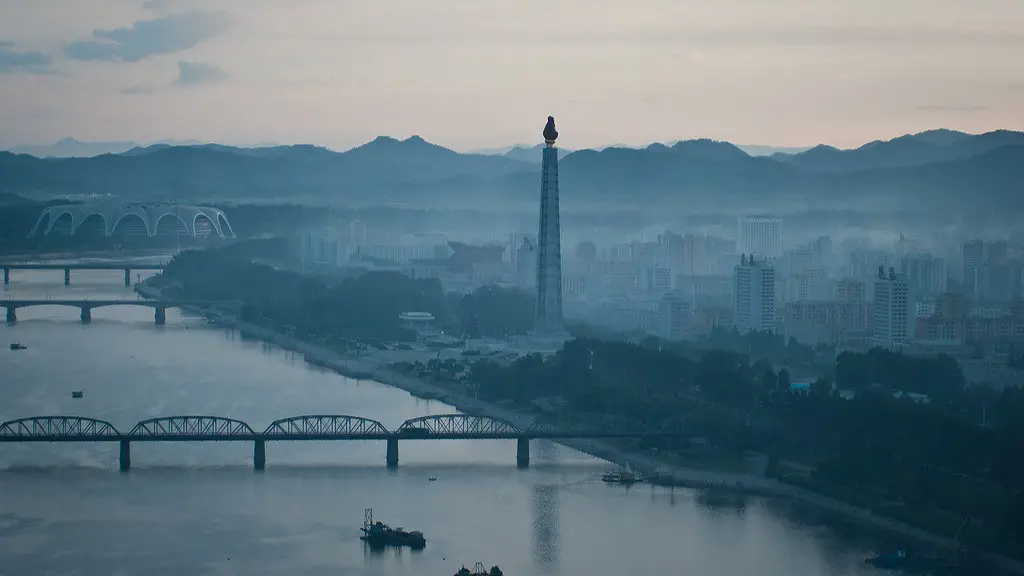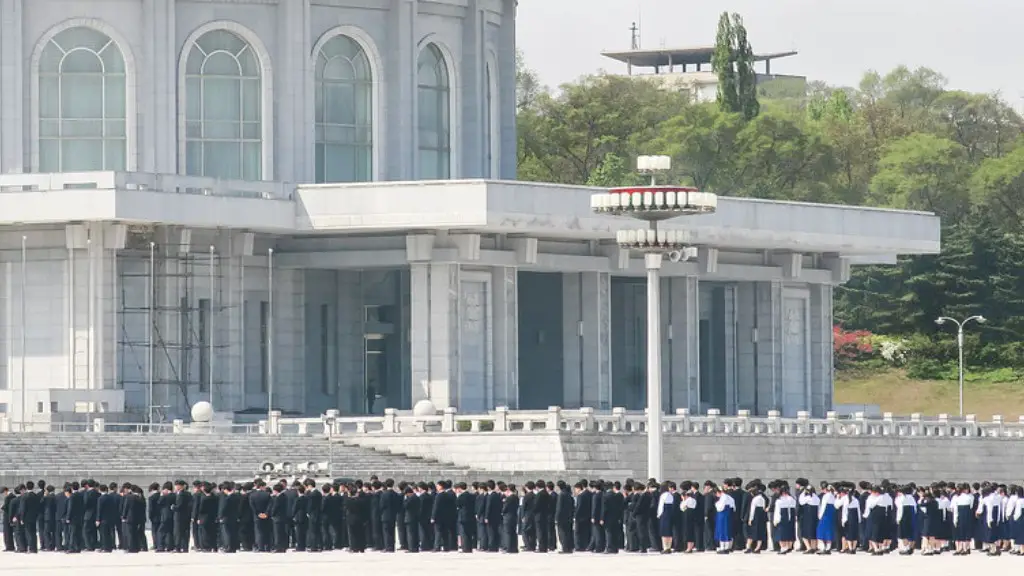Historical Trajectory
North Korea is not an easy place to understand. For more than a century the country has been under the influence of outside forces, starting with Japan’s annexation of the Korean peninsula in 1910, followed by Korea’s liberation after World War II in 1945. During that time, North Korea was transformed from an agrarian society struggling to survive to a closed-off communist state, struggling to assert its power in the region. In the late 1960s and early 1970s, North Korea began to move away from the Soviet model of economic development and towards a more self- determined path. This meant investment in heavy industry, rural reconstruction and agricultural mechanization, but also the development of nuclear weapons and a hostile attitude towards the rest of the world.
Economic Challenges
The economic growth of North Korea has been held back by a number of drawbacks. The country lacks access to international markets, meaning it is unable to benefit from trade and global investment. North Korea is heavily reliant on China for trade, aid and fuel, and its currency is not readily convertible. This has caused its economy to remain heavily dependent on foreign assistance, especially from China. Furthermore, the country’s entrenched economic system, rooted in Stalinist central planning, has been slow to undergo reform. With its inefficient currency, lack of competent consular staff, and its outdated infrastructure, investment opportunities in the country are limited.
Sanctions and Isolation
The international community has imposed a range of sanctions on North Korea in an attempt to prevent it from developing nuclear weapons. Sanctions on North Korea have been ongoing since the late 1990s, when the UN Security Council imposed economic sanctions aimed at curbing the North’s weapons proliferation activities. North Korea’s nuclear tests in the early 2000s led to further sanctions from the US and the UN, prohibiting the import of luxury goods and the export of arms and nuclear technology. Since then, the sanctions have been expanded to include prohibited imports such as luxury cars, yachts, electronics and machinery, as well as restrictions on North Korean nationals obtaining employment abroad.
Nuclear Program
North Korea’s nuclear program has further complicated the situation and put the country in an even more precarious position. Not only do the sanctions limit the country’s ability to develop and benefit from international trade and investment, but its nuclear ambitions have heightened tensions with nearby countries and caused all diplomatic relations with the US, South Korea and Japan to break down. With ongoing fears of a nuclear conflict, foreign investors are understandably hesitant to invest in North Korea, causing the country’s economic growth to remain stagnant.
Political Leadership
The authoritarian political system and a lack of adequate leadership are two of the major factors impeding economic development in North Korea. The state-controlled economy has resulted in considerable human and economic losses, caused by a reliance on ineffective bureaucracy and state control, as well as inadequate plans for agricultural and industrial production. The international community’s concerns about potential military aggression have resulted in the lack of diplomatic dialogue, causing North Korea to remain highly isolated from the experience and insights of the global community.
Education and Knowledge
A lack of knowledge and education has held North Korea back from developing successfully. The educational system has been affected by the economic crisis, with schools and universities facing budget cuts, lack of resources and teacher shortages. The curriculum largely focuses on political teachings and ideologies, with the majority of graduates leaving school with limited knowledge of economics or technology. In addition, the educational system is highly censored, with dissenting voices or ideas about international politics and economic development rarely heard.
Conclusion
North Korea’s economic woes are multi-faceted. The country is hampered by a lack of access to international markets, limited reform, sanctions and isolation, a nuclear program and an authoritarian system, as well as a lack of education and knowledge. Unless North Korea is able to resolve some of these issues, it is likely to remain isolated and unable to unleash its full potential for economic development.
Foreign Investment and Trade
Foreign investment is crucial to any country’s economic development, and North Korea is no exception. However, due to sanctions, the country has been largely cut off from international markets, resulting in a stagnant economy. In order to unlock its economic potential, North Korea must find ways to open up to the world and allow foreign investment and trade.
North Korea has recently entered into negotiations with South Korea, Japan and the US to reduce tensions in the region and open the door to economic cooperation. However, these talks are still in the early stages, and it remains unclear if North Korea is prepared to make the necessary changes to unlock its economic potential. One major roadblock is the country’s existing sanctions against its economy, which have been highly damaging. Despite the potential for significant economic gains, it is likely that the US and other countries will be reluctant to lift sanctions until there is substantial progress in dismantling North Korea’s nuclear program.
In addition, for foreign investment to be successful, North Korea must create a business-friendly environment and make itself attractive to investors. This means reducing the current tax burden on small businesses, providing access to suitable financing and investment opportunities, improving the legal and regulatory framework, and introducing incentives such as tax breaks and investment subsidies.
Infrastructure and Technology
Given its current economic state, North Korea will need to invest significantly in improving its infrastructure in order to attract foreign investment and open up its markets. This includes building roads, railways, bridges and ports, as well as developing a more efficient telecommunications infrastructure and allowing access to the internet. In addition, the government should focus on upgrading its technological capabilities and invest in education, training and research and development.
These measures will not only improve the country’s economic situation, but also contribute to its long-term growth and development. By upgrading its infrastructure and technological capabilities, North Korea will become a more competitive economy and be better able to attract foreign investment and increase trade opportunities.
The Role of the International Community
The international community will have a critical role to play in North Korea’s economic development. The United Nations and its member states should consider ways to provide financial support to North Korea in order to help alleviate the economic situation, either through direct lending or through humanitarian aid. Additionally, international organizations such as the World Bank, International Monetary Fund and Asian Development Bank should provide technical assistance and advice on how to improve the regulatory and legal framework, address poverty and develop an effective infrastructure.
In addition, governments and corporations should begin to explore ways to initiate business partnerships with North Korea. This could include helping to develop the private sector, encouraging skills development and providing access to international capital and markets. Most importantly, the international community should continue to promote dialogue and diplomatic efforts to reduce tensions and develop constructive relationships.
The Way Forward
North Korea’s economic development will depend on the country’s commitment to reform and the willingness of the international community to come together to support its efforts. While the challenges ahead are formidable, North Korea could gain much from initiating serious reforms and attracting foreign investment. For this to be successful, there must be a commitment to creating a business-friendly environment and opening up the country to international trade, as well as an investment in improving infrastructure and technology.
Furthermore, North Korea must engage in meaningful diplomatic dialogue with its neighbours and the international community. This will not only open up investment opportunities, but also help to defuse tensions in the region. If North Korea is able to do this, it may be possible for the country to find the path to economic success.


